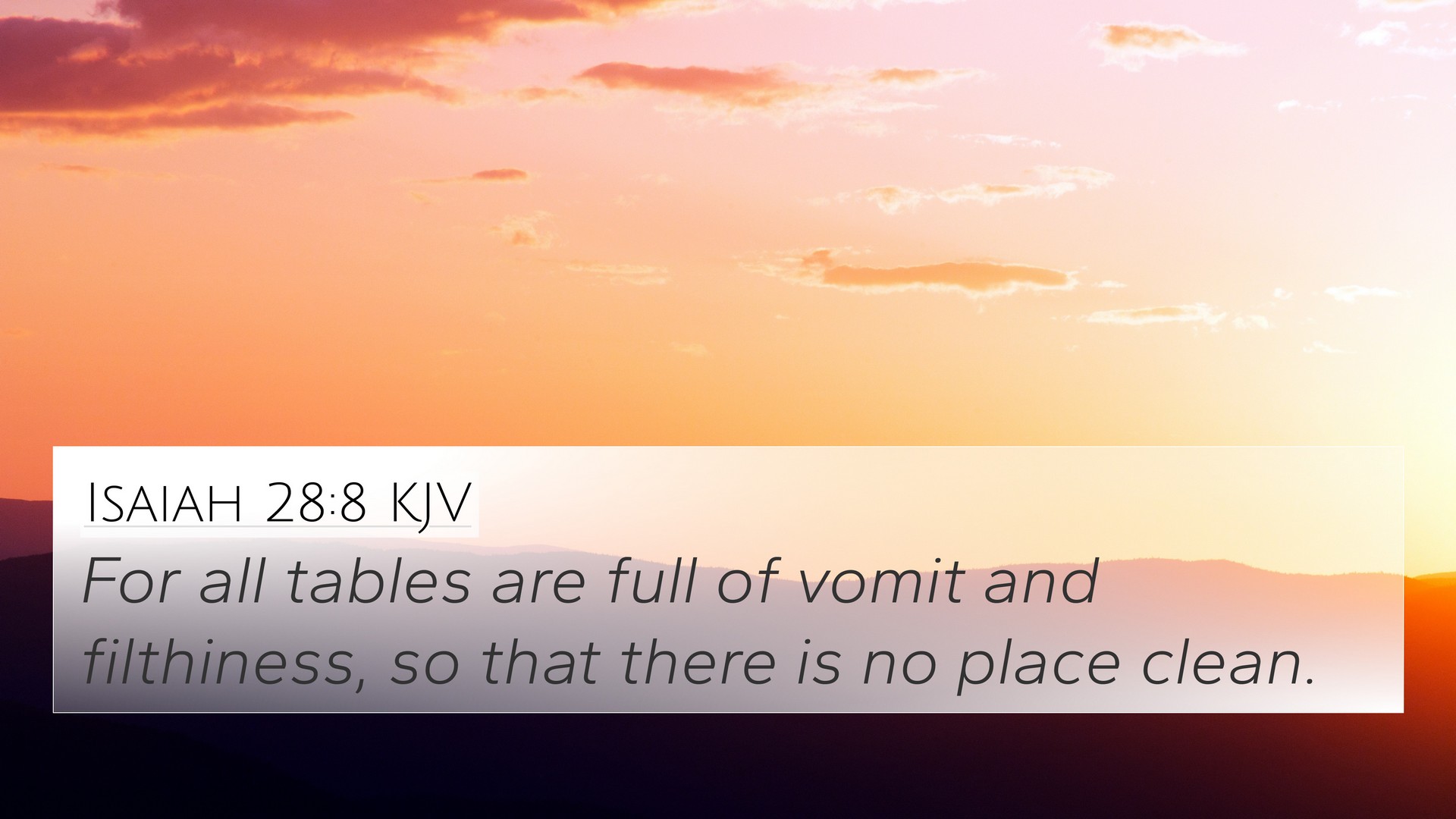Understanding Isaiah 28:8
Verse Context: Isaiah 28:8 states, "For all tables are full of vomit and filthiness, so that there is no place clean." This verse emerges in a prophecy regarding the spiritual desolation of Israel, specifically addressing the leaders who have led the people astray.
Meaning and Interpretation
This verse encapsulates a striking image of corruption and moral decay within the society of Israel. The tables, which should symbolize nourishment and sustenance, are instead filled with 'vomit and filthiness', reflecting the state of the people’s hearts and their actions. This metaphor speaks to the unworthiness of their offerings and the spiritual pollution that has taken hold among them.
Insights from Public Domain Commentaries
- Matthew Henry: Henry emphasizes the stark picture painted by the prophet, illustrating the depth of the people's sin. He notes that even in their feasting, their hearts are distasteful to God, as they offer impure and unclean worship, thus signifying a complete abandonment of true religion.
- Albert Barnes: Barnes points out that this imagery is indicative of the leaders’ failure to provide spiritual nourishment. He interprets the verse as reflecting the extent of the nation's apostasy and the dire condition of the society that, instead of partaking in pure spiritual sustenance, they wallow in sin and deceit.
- Adam Clarke: Clarke elaborates on the metaphor of the 'tables', linking it to the practice of dining that should be a point of community and blessing. However, here, it indicates that they are under divine judgment and their state is one of disgrace, encapsulating their rebellion against God.
Key Themes
This verse dives into significant themes such as:
- Spiritual Corruption: Illustrates how the people have corrupted their relationship with God.
- The Role of Leadership: Emphasizes the responsibility of leaders in maintaining spiritual health.
- Dangers of Complacency: Warns against the complacency that can lead to moral decay.
Cross-References
Isaiah 28:8 can be understood better through cross-references to other Bible verses that emphasize themes of corruption, accountability, and divine judgment:
- Isaiah 1:21: "How the faithful city has become a harlot!" - Reflecting on the loss of purity.
- Jeremiah 6:15: "Were they ashamed when they had committed abomination?" - Discussing societal desensitization to sin.
- Ezekiel 22:3: "You shall be judged for your blood." - Acknowledging the consequences of corrupt leadership.
- Matthew 15:14: "They are blind leaders of the blind." - Connecting the theme of ineffective leadership in faith.
- Galatians 5:9: "A little leaven leavens the whole lump." - Sin's ability to corrupt thoroughly.
- Philippians 3:18-19: "They are enemies of the cross of Christ, whose end is destruction." - Warning against those leading others astray.
- Revelation 3:17: "You say, ‘I am rich, I have prospered.’" - Complacency in spiritual condition.
- James 3:1: "Let not many of you become teachers, knowing that we shall receive a stricter judgment." - Accountability of spiritual leaders.
- 1 Peter 2:9: "You are a chosen race, a royal priesthood." - Highlighting the privilege of living a pure and holy life.
- Romans 1:28: "God gave them over to a depraved mind." - Acknowledging the severe consequences of rejecting God's truth.
Conclusion
In exploring Isaiah 28:8, we uncover the profound implications regarding spiritual hygiene and the community's moral state. The powerful imagery serves as a backdrop for understanding the severity of disobedience against God and the dire consequences that ensue from a corrupted heart. By employing tools for Bible cross-referencing, one can navigate similar themes throughout Scripture that echo the sentiments in Isaiah, allowing for a richer understanding of God’s word.
Further Exploration
For those seeking to deepen their understanding of this verse and the contextual connections within Scripture, various tools and resources are available for Bible cross-referencing. These include:
- Bible concordances - To identify similar themes and words.
- Bible cross-reference guides - Offering structured ways to find connections.
- Bible reference resources - Such as study Bibles with cross-referencing systems built-in.
- Cross-reference Bible study methods - Techniques for learning through connections.
- Comprehensive Bible cross-reference materials - Collections of cross-references for in-depth study.





